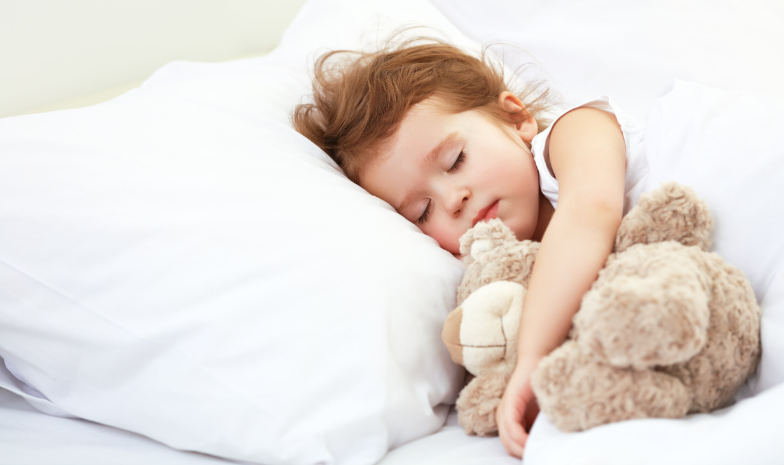Putting children to bed can be challenging, but it is very important, especially when you want the best results.
Helping your child go to bed earlier has numerous benefits, including improving their general health, mood, and cognitive abilities.
Given the fact that many parents experience such a situation, it is vital to be aware of methods that can be employed to help the child adapt to the change.
In this piece, we’ll focus on how to make your kid go to bed earlier.
Understanding Sleep Needs for Children
It is important to know the kids’ sleeping requirements for their development and health improvements.
Parents need to understand these needs and ensure the children are well-rested. Sleep is one of the fundamental human needs, and its quantity is directly related to a person’s age.
Recommended sleep durations for different age groups.
Parents and caregivers must familiarize themselves with children’s sleeping patterns to address their needs appropriately.
A child’s sleeping needs generally differ a lot depending on age. Here are the recommended sleep durations for different age groups:
- Newborns (0-3 months): Babies up to one month need the most sleep, between 14 and 17 hours in a single day. In some cases, a nap or portion of sleep is taken at different periods of the day and night, not in intervals of hours.
- Infants (4-12 months): It’s important to also mention that as infants grow, they require slightly less sleep and need about 12 – 16 hours in a day, including nap times. If you make them go to bed at the same time each night, some may begin to retain a standard sleep cycle.
- Toddlers (1-2 years): Specifically, preschool children or toddlers should sleep for about three hundred and eighty to four hundred and twenty minutes daily, excluding nap time. They are at an age when they must have a reasonable bedtime and a tight schedule to avert frequent wake-ups at night.
- Preschoolers (3-5 years): The target group is preschoolers, who should have 10-13 hours of night’s sleep in addition to nap time. This is also important at this age since many children in this age group drop naps during the day to attend to other important activities at school.
- School-aged children (6-12 years): When they start school, children need 9-12 hours of nutritious sleep each night. Thus, they should be put to bed on time during work and holidays to receive enough sleep to excel academically and socially.
- Teenagers (13-18 years): It is equally essential for teenagers to understand that the human body requires approximately 8-10 hours of sleep at night. This is due to other biological changes that make them prefer late nights, thereby compromising sleep by staying up later or very early in the morning.
Signs that your child might not be getting enough sleep.
Parents need to identify common symptoms that may show that their child is not getting enough sleep and get help as soon as possible.
In particular, children who do not get enough sleep are likely to experience poor physical, educational, and emotional progress.
Here are some key indicators that your child may be sleep-deprived, along with more detailed explanations:
Irritability and Mood Swings
One of the symptoms associated with lack of sleep in children is poor attitude and temper tantrums.
A child who is not healthy and is not able to have proper rest most of the time might get annoyed and angered easily by sensitive issues.
They may experience high levels of mood swings, declaim, or cry in situations that do not warrant it.
This irritability can put some finesse in the interaction with parents, siblings, friends, and others, making it stressful. Sleep-deprived children may also experience some form of impaired executive function that sees them swing from one extreme of the mood spectrum to the other.
Difficulty Waking Up
Another clear indication that a child is not receiving adequate sleep is constantly waking up in the morning in a confrontational manner.
If your kid requires several tries to get out of bed or waking up from bed is a real struggle each morning, then it can be safe to assume that the child is not well-rested.
This can lead to instances where the child wakes up late, misses the school bus, and parents are stressed as they make up for the lost time.
Morning procrastination is considerably regrettable in children who have difficulties waking up early since they retain fatigue and drowsiness throughout the initial part of the morning.
Hyperactivity
It is also worth mentioning that sometimes children sleep too little, and as a result, their activity levels seem much higher, which may be associated with hyperactivity. If a child has been overtired, it might appear very active, starry-eyed, and restless, unable to sit still.
This deficiency might cause them to have short attention spans on exercises or assignments and, at times, be easily carried away.
This is especially the case with hyperactivity resulting from tiredness since the body acts on the principle to do all it can to avoid being tired by alerting the person.
However, children, parents, and educators may mistake that behavior for ADHD rather than associate it with lack of sleep or poor sleep quality.
Trouble Concentrating
They suggest that when children are deprived of sleep, such as staying up late at night watching television, they have difficulty concentrating, a short attention span, and poor compliance.
This can be observed mainly in schooling, where focus is expected to be maintained over prolonged periods to study and do homework.
If a child is sleepy, then he or she may be a daydreamer, easily distracted, or not following instructions as he or she is supposed to.
They may also spend more time on homework and demonstrate less accomplishment in tests and assignment activities.
Lack of proper sleep makes it hard for the child to focus, greatly affecting their performance. Thus, it causes frustration among children and concerns among parents and teachers.
Drowsiness and Sleepiness during the Day
Traveling in the car, while at school, or engaging in any other normal waking hours activity and falling asleep is an obvious sign of a child’s lack of sleep at night.
Diurnal sleepiness can impact one’s ability to engage effectively in various activities such as learning, playing, socializing, etc.
Generally, a child who has dozed off in the night will fail to make it to class or wake up tired enough to focus, play, or even comply with instructions in an activity they used to enjoy.
This is because, during the day, the body is struggling to compensate for lost sleep – a fact that is evidenced by the fact that some people feel sleepy during the day.
Physical Symptoms
The results are that if the child has inadequate sleep, it can pretend to have a headache or a stomach ache.
Most of these complaints are frivolous and cannot be explained by medical issues but can be attributed to lack of sleep.
The consequences of sleep loss have been found to include impaired immune system functioning. Chronic sleep loss was found to impair immune system functioning, making children more vulnerable to diseases.
Another significant issue related to poor sleep quality is that it hinders the body’s capacity for maintenance and renewal, resulting in further reports of aches and pains.
It is not uncommon for a parent to realize that certain behaviors are primarily evident when the child has received a low amount of sleep or has had a night of poor sleep quality.
Reduced Academic Performance
Lack of sleep may also affect the ability to focus and learn, including the ability to pay attention in class or when studying.
It alters children’s learning abilities and memories when working on various assignments, which can lower their grades and become a source of frustration.
The human body needs to consolidate memories and information acquired throughout the day, hence the need for a good night’s sleep.
If a child compromises his or her sleep time, the child is likely to have problems trying to understand new things, memorizing, and even applying knowledge.
This can lead to a vicious cycle where the student performs poorly in school due to lack of sleep, stress, and anxiety and is thus unable to get adequate sleep.
Behavioral Issues
Lack of sleep may lead to extreme behavior, such as defiance, oppositional behavior, or poor impulse control.
Lack of sleep leads to increased negative behavior among children and conflicts when disciplining them or carrying on with regular daily routines.
Hence, they tend to argue more, disobey instructions, and display signs of oppositional defiance.
This can also set a rather harmful and destructive tone in the home atmosphere, which, in turn, negatively affects the interactions between the child and their caretakers.
Some aspects that can be sorted out concerning sleep include solving sleep problems, which can improve overall behavior, therefore enhancing the easy implementation of positive parenting techniques to ensure orderliness in the home.
Assessing Current Sleep Patterns
Evaluating your child’s current sleeping habits plays a vital role in identifying sleeping patterns that are good for his or her well-being.
Examples include identifying main activities that may interfere with the desired shift in their sleeping pattern and analyzing their bedtime and wake-up times in order to develop a better sleep strategy.
I was observing and recording current bedtime and wake-up times.
First and foremost, it is required to carefully watch and record the baby’s sleeping schedules to get at least one week’s results. This consists of keeping records of the hours your child is put to bed and when they wake up. Recording that information is explained here: Keeping a sleep diary can be effective. Here’s what to include in the sleep diary:
- Bedtime: If possible, it can be noted when they go to bed and the time they wake up actually sleeping. This can be useful in ascertaining the time taken to complete the various activities before sleeping and the time actually spent sleeping.
- Wake-Up Time: The next activity is to note the time your child wakes up in the morning. Overall, Include any nighttime awakenings, how long they last, and any night shifts.
- Naps: If your child still naps at a certain age, monitor the nap times, how early they start, and when they wake up.
- Sleep Quality: Record any comments that will arise regarding the length, frequency, and quality of your child’s sleep, including interruption, movement, or delayed sleep onset.
- Activities Before Bed: Document the types of activities that your child indulges in before they start sleeping, such as watching television using a computer, reading, or playing. This can eventually assist in pinpointing possible habits that interfere with healthy sleep.
Identifying potential obstacles to an earlier bedtime.
Now that you have determined an issue with your child’s sleep habits, the next step is to assess what might be causing it and delaying your child from going to bed earlier.
Common obstacles include:
1. Technology Usage
In this case, screen devices such as Televisions, tablets, smartphones, and other devices will disrupt the child’s sleep patterns one after the other, late at night or before bedtime.
Blue light is emitted by devices such as TVs, Smartphones, and tablets. It interferes with the body’s production of melatonin, making it difficult for your child to sleep.
One way to address this issue is to ensure that the child is not allowed to watch any screen for at least one hour before sleep.
2. Irregular Daily Schedules
Unpredictable timings such as wake-up, meal, study, play, and speech could affect a child’s natural rhythm.
Authorities are to attempt to create a stable daily schedule for kids, which should suggest when certain activities are to be accomplished, like eating, doing homework, or just having leisure time.
This schedule has to be followed by the time when they should be sleeping.
3. Diet and Exercise
Another aspect affecting sleep is an individual’s diet and activity levels. Caffeine or sweet foods that should not be eaten by children in the evening can make them stay up.
In separate instances, moderate exercise assists in the achievement of good sleep while vigorous exercises, if done close to sleep time may be stimulating. Promote balanced nutrition early in the day and sufficient physical exercises.
4. Environmental Factors
It is now important to know how well the family child will be able to go to sleep because the sleep environment is rather important in this matter.
Physical environmental influences include the level of warmth or coolness in a bedroom, the level of noise, and the level of illumination.
See to it that the room your child chooses to sleep in has the right temperature, which is cool, much less noisy, and very dark. Such things as blackout curtains and using those white noise machines can be employed if needed.
Establishing a Consistent Bedtime Routine
It is important that children develop a regular sleep pattern. This assists in informing their bodies that it is time for rest and ensures that adequate deep sleep is obtained during the night.
To create an effective bedtime routine, follow these steps: first, the child weighs the body warm from a warm bath, and the whole body temperature decreases; second, the child listens to the story as a kind of security factor during bedtime storytelling; third, the ambiance is created by turning off the light, and it calm.
Creating a Sleep-Friendly Environment
Some tips that can help prepare children for a good night’s rest are preparing their bedroom for sleep. To do this, ensure the room is not too warm. It should be between 65°F 70°F because cooler temperatures are better for sleeping.
Ensure that you patent the room with blackout curtains to ensure that there is no outside light that may disturb the child at night. You could also possibly provide a night lamp since, to some children, total darkness is not suitable.
Exclude noise by using sound insulation or white noise producers to quiet the room for nursing. Apart from objects, it is also vital to eliminate stimuli such as games and gadgets that may otherwise excite the mind, making it difficult to relax.
Promoting Relaxation Before Bedtime
Promoting relaxation before bedtime is vital in helping children wind down and prepare for sleep.
Engaging in calming activities can make this transition smoother and more enjoyable. Reading a favorite book together can provide a comforting routine that signals it’s time to settle down.
Playing soft, calming music can create a soothing atmosphere that helps ease any lingering restlessness.
Gentle stretches or simple yoga poses can relax the muscles and release tension built up during the day. Incorporating these activities into the nightly routine can create a peaceful pre-sleep ritual that encourages relaxation and sets the stage for a restful night’s sleep.
Addressing Common Challenges
Tackling typical issues such as sleep problems or nighttime fear or anxiety is not easy but involves perseverance, compassion, and commitment.
Parents who are experiencing bedtime resistance and abuse must stick to operational rules while at the same time being sympathetic to the child’s feelings.
Be sure to stick to a strict bedtime regimen and be firm in enforcing it, but at the same time, be gentle and reassure the children involved, giving them lots of encouragement when they fall in line as required.
Offer options to your child so that they do not feel frustrated, but let them know that you are the one who sets the rule on when to sleep.
If your child becomes scared or anxious at night, assure him there is no shame in it, and let him share whatever he is frightened of with you.
You need to listen to their anxiety and stress, express understanding of their feelings, and empathize with them. Encourage using deep breathing, visualization, or anything that fades away the stress that could be causing sleep disruption.
Encouraging Daytime Activities for Better Sleep
Improvement of daytime habits, particularly in children, is crucial in establishing better sleep, with physical activity being a key factor.
Physical activity during the day is significant for the body because it relieves energy throughout the day, ensures children have healthy sleeping patterns, and improves their overall well-being.
Help your child use some energy through activities like playtime, sports, organized activities, or any other activity that can make your child active during those hours.
However, the problem lies in the fact that some toddlers distract themselves with activities during the day and take naps at certain hours, which can disrupt night sleep.
Although naps during the day are quite useful, they can be very disruptive to nighttime sleep if not well managed.
Shorter naps during the day and especially avoiding nap breaks in the late afternoon could go a long way in ensuring that they do not interfere with the bedtime routine.
Role of Nutrition in Sleep
The connection between nutrition and sleep is fundamental, as nutrition influences or is influenced by sleep depending on the type and quality of nutrition.
For improved sleep, eat foods that are rich in tryptophan. This compound aids in the production of serotonin and melatonin, which are essential for good sleep.
Choose the right carbohydrates, such as whole grains, and meals containing magnesium, such as green leaves and nuts.
It is also advisable to avoid foods that contain high levels of caffeine and sugars, as these have the potential to affect the quality of sleep.
In other words, you want to ensure your child gets quality sleep at night, and one way to do this is by including foods that encourage sleep and avoiding or limiting stimulants.
Seeking Professional Help
If sleep problems persist and impact the child’s ability to function during the day, or if there is suspicion of a sleep disorder, a pediatrician or sleep specialist might be needed.
If your child cannot sleep all night or wakes up in the middle of the night, feels too sleepy or sleep-deprived during the daytime, or has behaviors during sleep that you find not normal, you better consult a professional.
Furthermore, suppose you have not effectively implemented sleep training strategies at home, or the child’s sleep issues appear to be causing substantial discomfort for the family. In that case, it is prudent to consult a professional.
Conclusion
You may be surprised to learn that simple tips can assist your child develop a more effective bedtime schedule and promote better sleep.
Begin by setting a regular sleep schedule and avoiding sleep interruptions. Create a comfortable sleep environment and opt for an enjoyable pre-sleep routine such as reading or listening to soothing music.
Promote waking-time activities as a way of using up energy, but be careful, especially with nap times, so that you do not disrupt night sleep.
Furthermore, it addresses food intake by suggesting foods that help promote sleep and exclude foods that interfere with sleep, such as caffeine and sugars, before bedtime.
During this process, parents must remain consistent and positive with their children and comprehend that it requires time.



